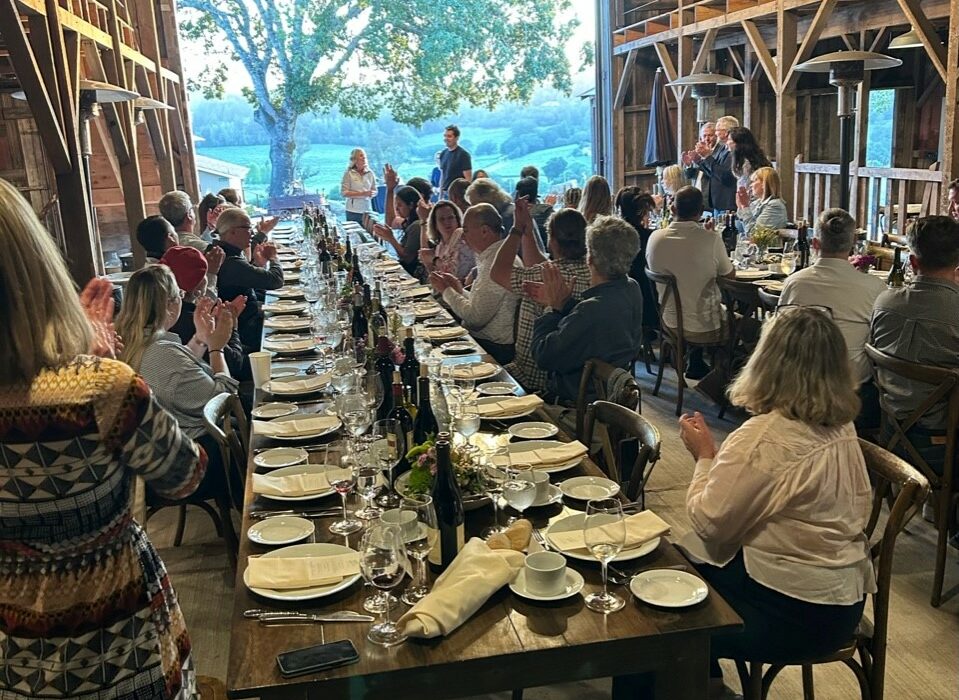Wine is Communal
By Virginie Boone
“Drinking good wine with good food in good company is one of life’s most civilized pleasures”
– Michael Broadbent
Last week a sizable contingent of people visited Sonoma County on behalf of Areni Global for Areni Live: California Edition. Areni Global is an international research institute focused on the future of fine wine with members all around the world. Its mission is to help companies and decision makers build a sustainably secure, prosperous and just wine industry.
Sonoma County Winegrowers is a longtime partner of Areni Global and hosted this event in partnership with the Wine Institute and with collaboration from Napa Valley Vintners.
The live version is held annually, a multi-day event bringing top minds together to think about the issues that face fine wine in panel discussions, roundtables and collective intelligence workshops.
A keynote by Sonoma County Winegrowers’ president Karissa Kruse focused on its Farm of the Future Initiative, a forward-thinking effort and innovation accelerator where businesses will share new technologies and put them into real-life practice to quickly and effectively respond to climate impacts and changes in the marketplace.
Throughout Areni Global’s time in Sonoma County, it organized the group into six committees to take part in discussions on topics ranging from the future of wine education to consumer segmentation and the future of vines.
One of these topics was “Racing to Zero: In Pursuit of Game Changing Agriculture,” with Katie Jackson of Jackson Family Wines, Alison Jordan of the Wine Institute of California, Cristina Lazcano of UC Davis, and Alice Waters, the restaurateur and activist from Chez Panisse.
Vineyard visits took place at a range of sites across Sonoma County, including at La Crema, Littorai, Bedrock, Iron Horse and Paul Hobbs.
Along the way, meals and wines are of course shared, with the best night of all taking place at a recently renovated barn up on a hill at Dutton Ranch, where two long tables were set up for attendees to dine.
It was this dinner that strongly drove home the point – not a new one – that wine is communal. Here you had a barn full of people from all corners of the earth, including China, Singapore, South Africa, Chile, Argentina, New Zealand and across Europe, involved in wine in some way.
All had been asked to bring a bottle to share with the group that evening. The bottles reflected as much diversity as the people, ranging from Chinese Pet-Nat to 1982 Haut-Brion to 2008 Ravenswood RRV Barricia Vineyard.
Had we all been asked to bring that many bottles of beer to share, we would have been too full to eat dinner. Would they all have had a story and a sense of place? Had we all brought bottles of whisky or tequila, the stories would have been good, but we would have all been face down in the vineyards, sleepy and slurry, not able to enjoy each other’s company for long.
No, when people gather to enjoy food and meaningful conversation, wine is the right call every time. It opens doors, it straddles differences, it bridges cultural gaps and language barriers, it allows a shared experience to unfold over time and for learning and discovery to happen together instead of alone.
This is wine’s power and its promise. It is why it should be protected as part of our shared multicultural legacy, one that begins with and relies on farming at its core.
Take part in a bigger discussion by registering for an Areni Global webinar called Securing the Future of Fine Wine tomorrow, June 29, at 8 am PST. Joining the panel will be Sonoma County Winegrowers CEO/President Karissa Kruse, and Honore Comfort, Vice President of International Marketing with the Wine Institute of California.


